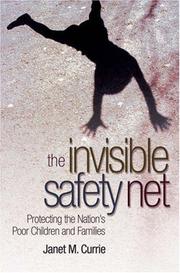| Listing 1 - 10 of 13 | << page >> |
Sort by
|
Book
Year: 1995 Publisher: New York, NY Russell Sage Foundation
Abstract | Keywords | Export | Availability | Bookmark
 Loading...
Loading...Choose an application
- Reference Manager
- EndNote
- RefWorks (Direct export to RefWorks)

ISBN: 0812929136 9780812929133 Year: 1996 Publisher: Paris: Odile Jacob,
Abstract | Keywords | Export | Availability | Bookmark
 Loading...
Loading...Choose an application
- Reference Manager
- EndNote
- RefWorks (Direct export to RefWorks)
United States --- Politics and government --- Economic policy --- Social policy --- Foreign relations --- 1993-2001 --- United States - Politics and government - 1993-2001 --- United States - Economic policy - 1993-2001 --- United States - Social policy - 1993 --- -United States - Foreign relations - 1993-2001

ISBN: 0812925866 9780812925869 Year: 1994 Publisher: New York: Times books,
Abstract | Keywords | Export | Availability | Bookmark
 Loading...
Loading...Choose an application
- Reference Manager
- EndNote
- RefWorks (Direct export to RefWorks)
United States --- Politics and government --- Economic policy --- Social policy --- #SBIB:328H31 --- Instellingen en beleid: VSA / USA --- 1993-2001 --- 1993 --- -United States --- -#SBIB:328H31 --- -United States - Politics and government - 1993-2001 --- United States - Economic policy - 1993-2001 --- United States - Social policy - 1993
Book
ISBN: 1576753875 1282298941 9786612298943 1576759482 9781576759486 9781609944025 160994402X 9781609943134 1609943139 9781282298941 9781576753873 9781576753873 Year: 2006 Publisher: San Francisco : Berrett-Koehler,
Abstract | Keywords | Export | Availability | Bookmark
 Loading...
Loading...Choose an application
- Reference Manager
- EndNote
- RefWorks (Direct export to RefWorks)
As the new century unfolds, Americans face prodigious economic and social challenges, yet nothing unifies the various strategies and causes that attempt to meet these challenges. Economist Jared Bernstein believes that frames such as ""the ownership society"" stress an ever-shrinking role for government and an ever-increasing risk for individuals, clearly implying ""You're on your own."" Arguing that this shift toward extreme individualism needlessly reduces the country's economic security and the living standards of most families, he describes the political and economic forces that pushed the
Capitalism -- United States. --- Economic security -- United States. --- Individualism -- United States. --- Social justice -- United States. --- United States -- Economic policy -- 2001-2009. --- United States -- Social policy -- 1993-. --- Capitalism --- Individualism --- Economic security --- Social justice --- Business & Economics --- Economic History --- United States --- Economic policy --- Social policy

ISBN: 058548001X 0585325278 9780585325279 9780585480015 0814797547 0814797555 0814771270 0814769713 9780814769713 Year: 2000 Publisher: [Place of publication not identified] New York University Press
Abstract | Keywords | Export | Availability | Bookmark
 Loading...
Loading...Choose an application
- Reference Manager
- EndNote
- RefWorks (Direct export to RefWorks)
Do contemporary welfare policies reflect the realities of the economy and the needs of those in need of public assistance, or are they based on outdated and idealized notions of work and family life? Are we are moving from a "war on poverty" to a "war against the poor?" In this critique of American social welfare policy, Sanford F. Schram explores the cultural anxieties over the putatively deteriorating "American work ethic," and the class, race, sexual and gender biases at the root of current policy and debates. Schram goes beyond analyzing the current state of affairs to offer a progressive alternative he calls "radical incrementalism," whereby activists would recreate a social safety net tailored to the specific life circumstances of those in need. His provocative recommendations include a series of programs aimed at transcending the prevailing pernicious distinction between "social insurance" and "public assistance" so as to better address the needs of single mothers with children. Such programs could include "divorce insurance" or even some form of "pregnancy insurance" for women with no means of economic support. By pushing for such programs, Schram argues, activists could make great strides towards achieving social justice, even in today's reactionary climate.
Public welfare --- Social Conditions --- Sociology & Social History --- Social Sciences --- #SBIB:041.IOS --- #SBIB:316.8H40 --- #SBIB:35H437 --- #SBIB:35H6030 --- Sociaal beleid: social policy, sociale zekerheid, verzorgingsstaat --- Beleidssectoren: sociale zekerheid --- Bestuur en beleid: nationale en regionale studies: Verenigde Staten --- United States --- Social policy --- Public welfare -- United States. --- United States -- Social policy -- 1993-.

ISBN: 9780691122687 0691122687 9780691138527 0691138524 128215852X 9786612158520 1400826993 9781400826995 9781282158528 Year: 2006 Publisher: Princeton: Princeton university press,
Abstract | Keywords | Export | Availability | Bookmark
 Loading...
Loading...Choose an application
- Reference Manager
- EndNote
- RefWorks (Direct export to RefWorks)
In one of the most provocative books ever published on America's social welfare system, economist Janet Currie argues that the modern social safety net is under attack. Unlike most books about antipoverty programs, Currie trains her focus not on cash welfare, which accounts for a small and shrinking share of federal expenditures on poor families with children, but on the staples of today's American welfare system: Medicaid, Food Stamps, Head Start, WIC, and public housing. These programs, Currie maintains, form an effective, if largely invisible and haphazard safety net, and yet they are the very programs most vulnerable to political attack and misunderstanding. This book highlights both the importance and the fragility of this safety net, arguing that, while not perfect, it is essential to fighting poverty. Currie demonstrates how America's safety net is threatened by growing budget deficits and by an erroneous public belief that antipoverty programs for children do not work and are riddled with fraud. By unearthing new empirical data, Currie makes the case that social programs for families with children are actually remarkably effective. She takes her argument one step further by offering specific reforms--detailed in each chapter--for improving these programs even more. The book concludes with an overview of an integrated safety net that would fight poverty more effectively and prevent children from slipping through holes in the net. (For example, Currie recommends the implementation of a benefit "debit card" that would provide benefits with less administrative burden on the recipient.) A complement to books such as Barbara Ehrenreich's bestselling Nickel and Dimed, which document the personal struggles of the working poor, The Invisible Safety Net provides a big-picture look at the kind of programs and solutions that would help ease those struggles. Comprehensive and authoritative, it will prompt a major reexamination of the current thinking on improving the lives of needy Americans.
Public welfare --- Poor --- Poor families --- Poor children --- Child welfare --- Aide sociale --- Pauvres --- Familles pauvres, Services aux --- Enfants pauvres --- Enfants --- Government policy --- Services for --- Politique gouvernementale --- Services --- Protection, assistance, etc. --- United States --- Etats-Unis --- Social policy --- Politique sociale --- Children of the poor --- Economically disadvantaged children --- Children --- Families --- Economic conditions --- Public welfare - United States --- Poor - Government policy - United States --- Poor families - Services for - United States --- Poor children - Services for - United States --- Child welfare - United States --- United States - Social policy - 1993 --- -Child welfare

ISBN: 0335203205 0335203213 9780335203208 Year: 2002 Publisher: Buckingham: Open university press,
Abstract | Keywords | Export | Availability | Bookmark
 Loading...
Loading...Choose an application
- Reference Manager
- EndNote
- RefWorks (Direct export to RefWorks)
Social policy --- Public welfare --- Great Britain --- United States --- #SBIB:316.8H00 --- #SBIB:316.8H40 --- #SBIB:35H437 --- #SBIB:35H6014 --- armoede --- economische politiek --- inkomensverdeling --- sociale ongelijkheid --- welvaartseconomie --- -Public welfare --- -Benevolent institutions --- Poor relief --- Public assistance --- Public charities --- Public relief --- Public welfare reform --- Relief (Aid) --- Social welfare --- Welfare (Public assistance) --- Welfare reform --- Human services --- Social service --- Sociaal beleid: algemeen --- Sociaal beleid: social policy, sociale zekerheid, verzorgingsstaat --- Beleidssectoren: sociale zekerheid --- Bestuur en beleid: nationale en regionale studies: Verenigd Koninkrijk --- Government policy --- -Social policy --- -Sociaal beleid: algemeen --- -#SBIB:316.8H00 --- Public welfare - Great Britain --- Public welfare - United States --- Great Britain - Social policy - 1979 --- -United States - Social policy - 1993

ISBN: 0253211255 0253332966 9780253211255 Year: 1997 Publisher: Bloomington Indiana University Press
Abstract | Keywords | Export | Availability | Bookmark
 Loading...
Loading...Choose an application
- Reference Manager
- EndNote
- RefWorks (Direct export to RefWorks)
Feminist ethics --- United States --- Social policy --- Feminist ethics. --- Philosophy --- Ethics --- Philosophy & Religion --- Physiology: reproduction & development. Ages of life --- Gynaecology. Obstetrics --- Sociology of the family. Sociology of sexuality --- Wages --- Ethics of family. Ethics of sexuality --- Demography --- Infectious diseases. Communicable diseases --- Surgery --- Polemology --- Social problems --- General ethics --- Sociology of social care --- Sociology of social welfare --- Feminism --- Moral and ethical aspects --- United States - Social policy - 1993 --- -Feminist ethics --- -Ethics of family. Ethics of sexuality --- United States of America --- Aids --- Violence --- Sex --- Marriage --- Army --- Migration --- Plastic surgery --- Pornography --- Social security --- Fatherhood --- Care --- Book --- Breasts --- Abortion
Book
ISBN: 9782724611915 2724611918 Year: 2012 Publisher: Paris : Presses de Sciences Po,
Abstract | Keywords | Export | Availability | Bookmark
 Loading...
Loading...Choose an application
- Reference Manager
- EndNote
- RefWorks (Direct export to RefWorks)
Health care reform --- Political leadership --- Services de santé --- Leadership politique --- History --- Réforme --- Histoire --- Obama, Barack --- Political and social views --- United States --- Etats-Unis --- Politics and government --- Foreign relations --- Economic policy --- Social policy --- Politique et gouvernement --- Relations extérieures --- Politique économique --- Politique sociale --- Services de santé --- Réforme --- Relations extérieures --- Politique économique --- Political and social views. --- Health care reform - United States - History - 21st century - Congresses --- Political leadership - United States - History - 21st century - Congresses --- Obama, Barack - Political and social views - Congresses --- United States - Politics and government - 2009- - Congresses --- United States - Foreign relations - 2009- - Congresses --- United States - Economic policy - 2009- - Congresses --- United States - Social policy - 1993- - Congresses --- Obama, Barack Hussein (1961-....) --- États-Unis --- 2009 --- -Relations extérieures --- -Health care reform --- -Obama, Barack Hussein (1961-....) --- 2009-
Book
ISBN: 1280594160 9786613623997 0199845379 9780199845378 9781280594168 9780190252625 0190252626 9780199845361 0199845360 9780199845385 0199845387 0199942781 6613623997 Year: 2012 Publisher: New York City : Oxford University Press,
Abstract | Keywords | Export | Availability | Bookmark
 Loading...
Loading...Choose an application
- Reference Manager
- EndNote
- RefWorks (Direct export to RefWorks)
The 2010 election serves as a bookend to one of the remarkable political periods in recent U.S. history. Amidst a profound economic crisis, Americans elected an African American to the presidency and massive Democratic majorities to Congress. Beginning in 2009, the President and Congress put forward a sweeping agenda to both address the economic crisis and enact progressive policies that liberals had been advocating for decades. Within a year and a half, they would pass health care reform and financial reform alongside a stimulus package of nearly a trillion dollars. Democrats also rescued the
Financial crises -- United States -- History -- 21st century. --- Health care reform -- United States -- History -- 21st century. --- Obama, Barack -- Political and social views. --- Political leadership -- United States -- History -- 21st century. --- Progressivism (United States politics) -- History -- 21st century. --- Race -- Political aspects -- United States -- History -- 21st century. --- United States -- Economic policy -- 2009-. --- United States -- Foreign relations -- 2009-. --- United States -- Politics and government -- 2009-. --- United States -- Social policy -- 1993-. --- Obama, Barack, 1961 --- -Political and social views --- United States --- Politics and government --- 2009-2017 --- Economic policy --- 2009 --- -United States --- Social policy --- 1993 --- -Financial crises --- History --- 21st century --- Health care reform --- Race --- Political aspects --- Foreign relations --- -Political leadership --- Progressivism (United States politics) --- Financial crises --- Political leadership --- Obama, Barack --- Political and social views.
| Listing 1 - 10 of 13 | << page >> |
Sort by
|

 Search
Search Feedback
Feedback About UniCat
About UniCat  Help
Help News
News